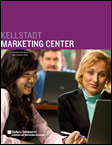"This class was by far one of the best classes that I've ever taken. After a couple of years of running my own company, I felt that I should take a class to prepare for my MBA. The Jacobs and Stone certificate more than met my expectations. Every class had experts coming to the classroom or talking to us via satellite. We were learning the latest developments in the multichannel marketing world. Dr. Kelly made the transitions from one topic to another very smooth by always connecting what we were hearing and seeing to the goals of this certificate.
In short, everything that you see in the syllabus will be thoroughly discussed in the classroom. You'll also get the best opportunity to network with business leaders as well as colleagues in your industry that are more than happy to share with you their experience."
-Reda Chafai
"In this ever-changing world of new media, MC2 is the perfect complement for classically trained marketers--enabling you to understand, embrace and integrate new media tools into your marketing plans for maximum effectiveness and efficiency. I was able to put this practical advice to work immediately and keep my credentials up-to-date through this certificate program."
-Jill Kahan
- Gain extraordinary, practical expertise from successful practitioners
- Learn the most powerful and cost-effective way to market and secure new customers
- Implement direct, interactive, digital and database marketing in your organization
Discounts may be available through membership in your marketing association.
Week 1
Multichannel Marketing Communication
- How marketers build multichannel marketing communication
- How multichannel is evolving
- Using smarter data, not just bigger data
- The growing role of inbound and content marketing
- Focus on outcomes, not processes
- Best practices in marketing measurement
- Case study
Week 2The Growing Role of Data in Marketing- Marketing to an individual person
- How data helps engage an audience across channels
- How is the data compiled
- What are the expectations from customers who share data
- What are the challenges/concerns with leveraging customer data in your marketing programs
Marketing Measurement & Attribution- How is marketing measured
- How do marketers track customer journeys
- How can marketing be optimized via measurement
Week 3Social Advertising- An overview of the social advertising industry and it’s growth over the last decade
- A review of social publishers and their various ad offerings
- Best practices for social advertising
- A step-by-step walkthrough of a social campaign from start to finish
Week 4Search Engine Marketing- Investment options and best practices for targeting your audience online. How marketers leverage Google and others to target search.
- What are best practices and risks of Display advertising.
Week 5Marketing Creative- How to best reach your target audience with the right messaging
- The creation process for building advertising assets
- What makes good ads vs bad ads
Search Engine Optimization- The difference between paid search advertising and organic search optimization
- How search engines rank pages
- What marketers do to get their pages ranked higher
- White hat and black hat SEO techniques
Week 6Channel Connection & Innovation- Google's perspective on Innovation and multichannel marketing. How can marketers connect the dots?
- What's on the horizon for future marketing considerations?
Week 7Direct Mail / Email / Addressable Media- How marketers leverage CRM and addressable media. Why direct mail still matters and how its changed over time. Business models - b2b vs b2c
- b2b channels for marketing
Week 8
Final student presentations
What are the requirements for the Integrated Marketing Communications Certificate?
To receive the IMC certificate, students must successfully complete three required courses and two elective courses plus one seminar. Follow the link to learn more about the IMC Certificate and review the list of courses.
Do I get DePaul credit for this class?
No, but some DePaul CPE courses have been approved for CEU credits. This is a professional education class with different requirements than courses taken for academic credit.
How big is the class?
Class size is limited to allow for a more interactive environment in the classroom. Most classes have fewer than 20 students.
Will I have to write papers and take exams?
While the assignments differ for each instructor and course, you will be assigned non-graded homework, and you will receive feedback on each of your assignments. Some courses also include in-class presentations.
Are the courses very technical?
Some of the topics are technical but are described in a way that a non-technical person can understand. At every stage of the program, theory is integrated with the technology - we aim to provide insight for technical and non-technical participants.
What is the difference between a certificate and a certification?
A certificate is earned after completion of a course or a series of courses. Certificates are usually awarded by a training provider or an educational institution. Certification typically includes an experience, an educational component and requires passing an exam. Certifications are awarded by governmental and/or professional agencies and often require recertification to remain certified.

